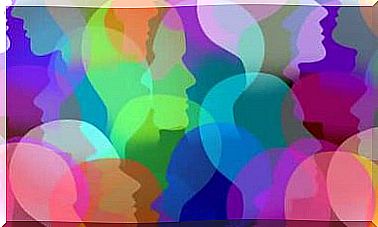Realities We Need To Accept

Faced with what we don’t like, we have different ways to position ourselves. We can complain about our bad luck, start working to change it, accept it and work so that it is not that point towards which our gaze is systematically directed. We can include it in our speech, we can exclude it from it. We have the option of accepting it in our thoughts or throwing away all those who refer to what we don’t like. However, one way or another, there are realities that we need to accept.
In other words, there are facts or phenomena that exist and will continue to exist. Thus, so that they do not affect or contaminate our well-being, we will have no choice but to learn to live with them, as we do, for example, with many of the quirks that others have and which we do not like very much.

The imperfection and the realities we need to accept
The mistake. We can take the somewhat romantic position of seeing failure as a good thing. Without it, we would not be able to learn, improve, experience that fabulous feeling that we are moving forward. Yesterday we did something wrong or average, today we do it better.
However, how many forgetfulness have not caused us anger? How many glasses were broken due to our clumsiness? We didn’t calculate the distance well and hit the car behind. We didn’t remember that the medical appointment was on Thursday and we went today. No matter how angry we get, no matter how much attention we pay, we will keep making these silly mistakes that don’t teach us much. So this is one of those realities that we need to accept.
The expectations
Facts are rarely placed in such a way as to follow exactly the path we have traced in our minds. We would have to load a truck instead of a suitcase in order to have a ready answer for all the unforeseen events. In the list, whenever we tried to list them, there would be a place for “others”.
This is not plausible. Taking a very cautious or restrained posture to avoid the fact that circumstances, in many cases, are unpredictable is a very big obstacle. It would be necessary to maintain a very slow speed when we are dynamic and changeable. In this sense, permanence is the exception, not the rule.
On the other hand, we cannot get rid of expectations, any more than we can get rid of first impressions and associated biases like the halo effect. Naturally, what we expect conditions different elements of the psychological game, some as important as self-efficacy or the control of our attention.
Working with what we perceive, not reality
A statue is not ugly. A person is neither honest nor a liar. She can often behave this way, which doesn’t mean she always does or isn’t selective in her behavior based on her social environment. In fact, we’re all like that, and that’s not what makes us self-serving people or more fake than a three-dollar bill.
In an image, two points are more or less apart depending on the zoom/scale we apply. We can think that Rio de Janeiro and São Paulo are very close or very distant states.
The advantage we have when we talk about this is that you and I can take the same unit of reference and give it an absolute value, free of judgment. However, transferring this measurement methodology to the psychological world presents its problems: imagine that Rio de Janeiro and São Paulo are moving all the time and that we do not have a means of transport between the two locations.
What would we use as a reference point? Most likely, what we see at that moment on the screen. Why? Because it is very comfortable to work only from our point of view and take into account only the information that comes to us through the senses at any given time. In other words, we tend to work with photos, when what we want is to work with videos and, within them, with a camera capable of rotating 360 degrees. However, this is not possible and is another of the realities that we need to accept.

Forgetting, the last of the realities we need to accept
I have the word on the tip of my tongue. The word I want to access is like an island. I know where it is, but I can’t find a way between the different references I have to lie down on its shores: its meaning, the last time I used it, the letter that starts or ends… Yes, I remember those details, but I can’t pronounce it now.
That face attended school with me. He is waiting in line. But what’s your name? He sat next to João and the math teacher caught his attention every day. Yes, another of the realities that we have no choice but to accept is the somewhat anarchic functioning of our memory.
We’ve just listed a few of these realities that we need to accept and that, when they arise, can generate significant frustration. Which ones would you include on this list and why?








